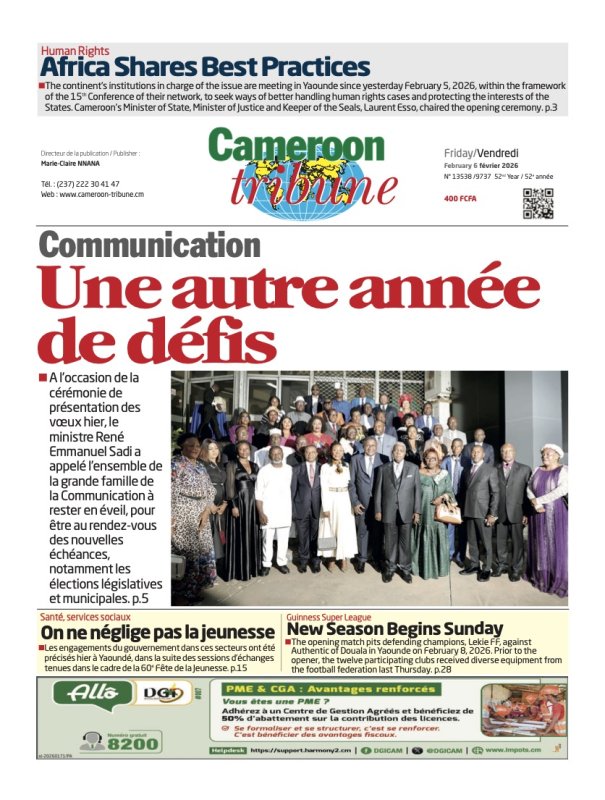Africa’s Dev’t: The Indispensable Technology Transfer!
- Par Godlove BAINKONG
- 22 Dec 2022 10:45
- 0 Likes
With the Second US-Africa Leaders’ Summit now over in Washington D.C., and the African leaders who took part in it back home, all and sundry are certainly taking stock of the gains from the high-level gathering. While America as a country is obviously beating its chest for hosting a whole continent, the 54 African countries which participated in the Washington conclave at either Presidential or other high-level positions are certainly devising ways of maximising their political and socio-economic gains. The win-win aspect of any cooperation!
What is certainly preoccupying Africa now is how well to tap from the 55 billion dollars that the Biden administration will be putting at the disposal of the continent in the next three years. Like in other cooperation fora that Africa entertains with countries across the globe, similar funds are almost always geared towards financing projects in specific sectors. The understanding here is that the best conceived projects that meet the conditions of the donor bag home the funds. In the case of the 55 billion US dollars promised funds, President Joe Biden made it amply clear that, “the number represents a comprehensive commitment from the United States to invest in Africa’s people, Africa’s infrastructure, Africa’s agriculture, Africa’s health system, Africa’s security, and more.” These areas are key to the sustainable development of any nation. Logically so as any nation without solid infrastructure, sustainable agriculture that provides quality and quantity food to a healthy workforce and whose security hangs on a balance cannot dream of emerging. Regrettably, these are Africa’s feeblest areas.
There is therefore need to change the storyline. This goes beyond simply attending international fora; be they bilateral or multilateral, and carrying home the message that this or that world leader or super power has pledged this or that amount for Africa. It entails making the best out of what such shoulder-rubbing avenues offer for present and future generations.
The US-Africa Leader’s Summit is just one among many others in which the hosts have promised huge sums of money to take Africa’s development to another level. There is China-Africa, Japan-Africa, France-Africa, Russia-Africa and a lot more. In almost all of these settings, the announced financial package for the continent doesn’t represent physical cash to be dished out to individual countries, but rather funding for well-drafted projects, most of whose contracts are won by firms from the donor countries. From a cursory look, one goes away with the feeling that such an approach is to ensure that the money is pumped into projects that can boost economic growth and facilitate reimbursement in due time.
The execution of such project therefore offers golden opportunities for Africa to tap from the wealth of experience of their foreign partners and be able to do better when such projects are over. What obtains on the ground appears to be everything except the transfer of technology that such partnerships present. The beneficiary countries do not seem to know the importance of technology transfer in project execution and the executing firms are sometimes never compelled by any contractual clause to do so. Results are that giant projects are executed from start to finish by expatriates while locals content themselves with offering unskilled labour. The project starts and ends with very few or none learning anything therein. Little wonder, the foreign companies that execute such projects are contracted thereafter to stay back and ensure their maintenance. The attitude of offering fish to Africa and the continent not being ready to learn how to fish has the tendency of keeping it down as long as the practice persists.
President Paul Biya of Cameroon in one of his recent outings in Washington underlined the indispensable need for technology transfer to speed up Africa’s socio-economic development. In his remarks at the forum on civil commercial space cooperation between the United States and Africa, the Cameroonian leader underlined that, “I find it fundamental for technology to be transferred to African countries for an equitable access to space and its opportunities.” The stakes surrounding this issue are common as he put it but the means available to Africa vis-à-vis the rest of the world is not the same. Technology is better in one than the other. Wondering how the continent can effectively combat climate change if it cannot observe from the sky, and by its own means, its impact on the forests, how would it be possible to carry out proper and sustainable urban planning if the appropriate technological tools are not available to Africa and “how can we envisage effectively fighting terrorist groups, which operate over large swathes of territory, if we lack adequate means to monitor the...
Cet article complet est réservé aux abonnés
Déjà abonné ? Identifiez-vous >
Accédez en illimité à Cameroon Tribune Digital à partir de 26250 FCFA
Je M'abonne1 minute suffit pour vous abonner à Cameroon Tribune Digital !
- Votre numéro spécial cameroon-tribune en version numérique
- Des encarts
- Des appels d'offres exclusives
- D'avant-première (accès 24h avant la publication)
- Des éditions consultables sur tous supports (smartphone, tablettes, PC)












Commentaires